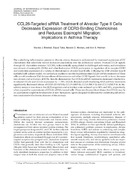| dc.description.abstract | The underlying infl ammation present in chronic airway diseases is orchestrated by increased expression of CC
chemokines that selectively recruit leukocyte populations into the pulmonary system. Human CCL26 signals
through CC chemokine receptor 3 (CCR3), is dramatically upregulated in challenged asthmatics, and stimulates
recruitment of eosinophils (EOSs) and other leukocytes. CCL26 participates in regulation of its receptor CCR3
and modulates expression of a variety of chemokines in alveolar type II cells. Utilizing the A549 alveolar type II
epithelial cell culture model, we carried out studies to test the hypothesis that CCL26-siRNA treatment of these
cells would ameliorate Th2-driven release of the eotaxins and other CCR3 ligands that would, in turn, decrease
recruitment and activation of EOSs. Results demonstrate that CCL26-siRNA treatments decreased interleukin4-induced CCL26 and CCL24 expression by > 70%. CCL26-directed small-interfering RNA (siRNA) treatments
signifi cantly decreased release of CCL5 (RANTES), CCL15 (MIP-1δ), CCL8 (MCP-2), and CCL13 (MCP-4). In bioactivity assays it was shown that EOS migration and activation were reduced up to 80% and 90%, respectively,
when exposed to supernatants of CCL26-siRNA-treated cells. These results provide evidence that CCL26 may be
an appropriate target for development of new therapeutic agents designed to alleviate the underlying infl ammation associated with chronic diseases of the airways. | en_US |

